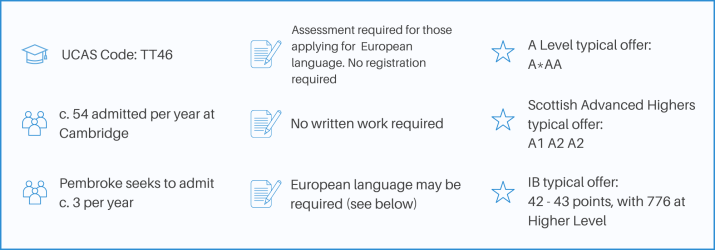Asian and Middle Eastern Studies
Asian and Middle Eastern Studies at Pembroke
Pembroke has a long association with Asian and Middle Eastern Studies and the College is keen to maintain this reputation. There is an internal fellow in AMES and the College often hosts seminars and lectures that enhance our students’ learning experience. Applicants are accepted for Arabic, Persian, Hebrew, Chinese, and Japanese.
Courses in AMES cover the major languages and cultural history of East Asia and the Middle East, broadly defined. On the Middle Eastern side of the Faculty, Arabic, Persian, and Hebrew may be combined with each other or with a modern European language. The department also offers Hindi and Sanskrit as options to Part IB and Part II students, respectively. Chinese and Japanese are ordinarily studied separately, but may be combined with each other at Part II level. Korean is offered, subject to availability, to Part II students studying Japanese. All subjects in the Faculty involve intensive study of the language or languages taken and a range of courses on the literature, culture, and history of East Asia or the Middle East.
In recent years Pembroke has had a strong academic record in the Tripos. The College aims to take two or three undergraduates a year, or more if the quality of the field allows. For full details of the Tripos see the Faculty website.
Admissions
We are seeking to admit students from all backgrounds, who have in common an interest in the subject. No prior knowledge of any of the languages offered is assumed (though it helps if applicants have learned the alphabet of the language before coming into residence); knowing too much in advance is sometimes a disadvantage, so check before deciding to spend your summer with your nose in a grammar book!
Having an A Level (or equivalent) in a foreign language is desirable, suggesting a proven ability to cope with language work, but applicants have been accepted from a wide variety of academic backgrounds. If you are applying to combine Arabic, Persian, or Hebrew with a European language, an A level (or equivalent) in the European language is required. Interviews consist mainly of general questions and discussion of applicants' A Level (or equivalent) work.
Applicants to Pembroke will not be asked to take an at-interview assessment, unless you are applying for a European language. AMES applicants wishing to study a European language are required to take the relevant MML at-interview admissions assessment. Please see the MML course page for information on the assessment format.
Pembroke AMES Teaching Staff
Dr Assef Ashraf - Director of Studies
As Director of Studies in AMES, I am responsible for overseeing students' academic progress and development during the four years of our course, regardless of which languages they are studying. Pembroke is a supportive College that takes the well-being of its students seriously, and my job is to ensure that AMES students are thriving.
I studied Arabic and Persian as an undergraduate student, before doing postgraduate studies in History, and am heavily involved in teaching in the AMES Faculty, so in some ways I am quite familiar with what it takes to be an AMES student. But I studied in the US and came to Pembroke and Cambridge in 2018, so in many other ways, I know what it feels like to be an 'outsider'! I think my own educational background has made me sensitive to the diverse backgrounds of our students, but also appreciate the wonderful things that the College and University can offer.
I am a historian of early modern and modern Iran and the Persian-speaking world. Much of my recent research has revolved around the questions of how and why political cultures endure, and how and why they change. I have recently published a book that explores this topic by focusing on the case of early nineteenth-century Iran and the formation of the Qajar empire. But I am also interested in the history of political thought, as well as in how the history and memory of the past can be used towards political ends.

